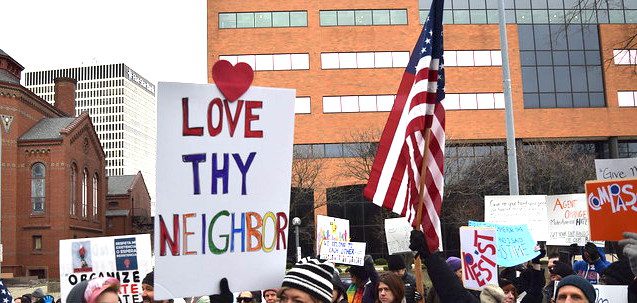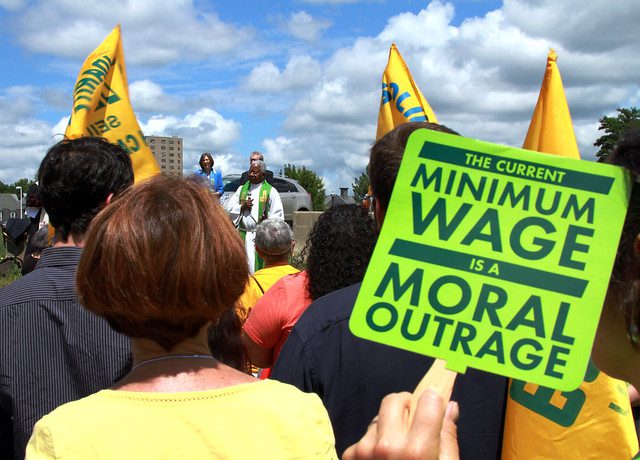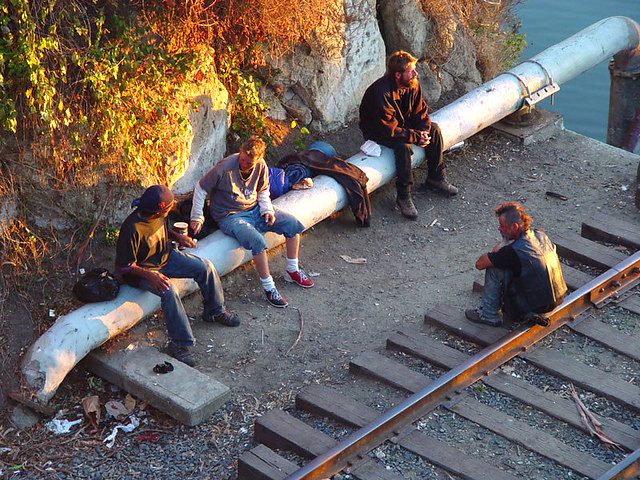
2017 protest. Photo by rchappo2002 via flickr, CC BY-NC-ND 2.0
We here at Shelterforce want to acknowledge the extremely painful events of the past week—from gun violence, white nationalist and racist attacks, to immigration raids—and recognize that while we often publish data findings from research studies and policy critiques on topics related to these issues, we know these issues are not abstract. These “issues” are people. They are our neighbors, and they are us.
Just What We Needed: You’ve probably heard about #GreenShirtGuy by now. The man, previously known as Alex Kack, became an internet sensation this week after he was recorded hysterically laughing at a woman who was loudly protesting a Sanctuary City measure at a Tucson, Arizona, council meeting. We know if we were at that meeting, we would have probably gotten pretty riled up by the anti-immigration protestor, who was armed with a “Make America Great Again” hat and sign. But Kack—who also happens to be a field organizer—just laughed at the insanity, and taught us that maybe we should try to do the same at times. “The majority of this country . . . understands that the loudest voices happening right now are kind of ridiculous. And I think the laughter is resonating because that’s how people feel right now,” Kack told KVOA.com.
The City of Los Angeles reached a groundbreaking settlement with HUD late last week when it agreed to develop 10,000 new affordable housing units, including 1,500 accessible housing units for people with disabilities. According to a HUD press release, the agreement resolves the city’s longstanding noncompliance with aspects of the Rehabilitation Act of 1973 and the Americans with Disabilities Act. The agreement includes the city’s retrofit of over 3,000 existing units for accessibility, as well as the city and HUD working on a program that will incorporate innovative accessibility enhancements into the creation of future affordable housing.
Representation matters. Results from a new pilot study by Southern Methodist University show that staff leadership at New York City cultural nonprofits do not reflect the demographics of the city itself. The survey received responses from nearly 7,000 individuals employed in various capacities at institutions that receive funding from the city’s Department of Cultural Affairs, and found that approximately two-thirds of people running arts organizations are white. Two-thirds of city residents are people of color. The study did, however, find strong representation among women, and smaller representation in LGBTQ and disabled staff.
Another Fight to Prepare For: Housing advocates are worried about a HUD proposal that was submitted to Congress that would make it more difficult to hold lenders accountable for housing discrimination. HUD is targeting the disparate impact rule, which is used to prove unintentional discrimination. We’re expecting there to be a lot of comments to the proposal after it is officially made public sometime this month.
The Affordability Puzzle: We’re really liking what’s happening over in Austin. The housing authority there is buying apartments in the private market and making some of them affordable to low- and moderate-income residents. “While a housing authority I don’t think has a responsibility for fixing all of [the housing shortage], we certainly feel a responsibility to try to address it as best we can,” says Michael Gerber, president and CEO of the housing authority. “We are a piece of the affordability puzzle in Austin,” he says. “We’re trying to do our part.”
What Else We’re Reading:
Housing Providers Deliver Vital Support to College Students Experiencing Homelessness, How Housing Matters
Open Borders Made America Great, The New Republic
After this edition, Shelter Shorts will be taking the rest of the summer off.
See you in September!





Comments